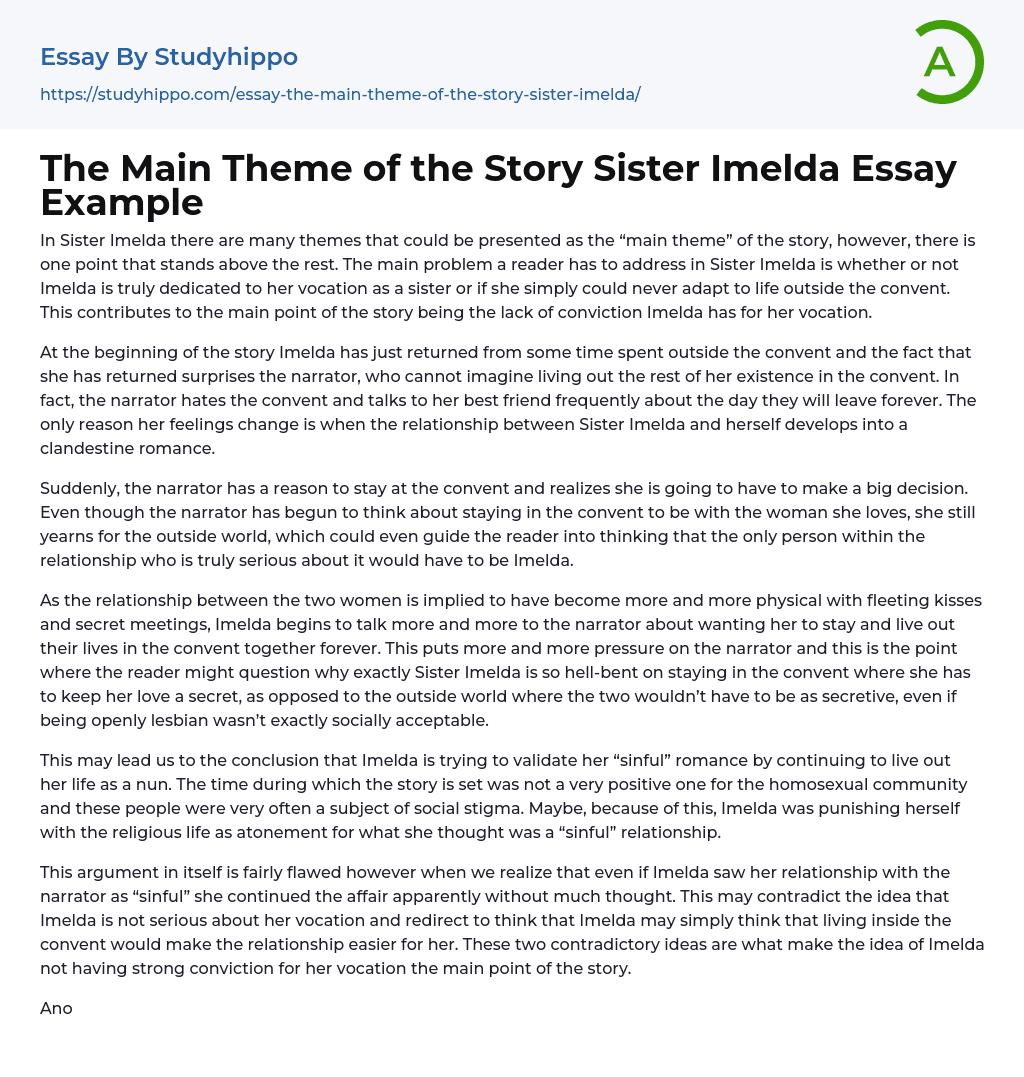In Sister Imelda there are many themes that could be presented as the “main theme” of the story, however, there is one point that stands above the rest. The main problem a reader has to address in Sister Imelda is whether or not Imelda is truly dedicated to her vocation as a sister or if she simply could never adapt to life outside the convent. This contributes to the main point of the story being the lack of conviction Imelda has for her vocation.
At the beginning of the story Imelda has just returned from some time spent outside the convent and the fact that she has returned surprises the narrator, who cannot imagine living out the rest of her existence in the convent. In fact, the narrator hates the convent and talks to her best friend freque
...ntly about the day they will leave forever. The only reason her feelings change is when the relationship between Sister Imelda and herself develops into a clandestine romance.
Suddenly, the narrator has a reason to stay at the convent and realizes she is going to have to make a big decision. Even though the narrator has begun to think about staying in the convent to be with the woman she loves, she still yearns for the outside world, which could even guide the reader into thinking that the only person within the relationship who is truly serious about it would have to be Imelda.
As the relationship between the two women is implied to have become more and more physical with fleeting kisses and secret meetings, Imelda begins to talk more and more
to the narrator about wanting her to stay and live out their lives in the convent together forever. This puts more and more pressure on the narrator and this is the point where the reader might question why exactly Sister Imelda is so hell-bent on staying in the convent where she has to keep her love a secret, as opposed to the outside world where the two wouldn’t have to be as secretive, even if being openly lesbian wasn’t exactly socially acceptable.
This may lead us to the conclusion that Imelda is trying to validate her “sinful” romance by continuing to live out her life as a nun. The time during which the story is set was not a very positive one for the homosexual community and these people were very often a subject of social stigma. Maybe, because of this, Imelda was punishing herself with the religious life as atonement for what she thought was a “sinful” relationship.
This argument in itself is fairly flawed however when we realize that even if Imelda saw her relationship with the narrator as “sinful” she continued the affair apparently without much thought. This may contradict the idea that Imelda is not serious about her vocation and redirect to think that Imelda may simply think that living inside the convent would make the relationship easier for her. These two contradictory ideas are what make the idea of Imelda not having strong conviction for her vocation the main point of the story.
Another facet to this idea could possibly be the fact that Imelda likes control, within the convent she has complete control over the relationship
and this is what makes her not open to the idea of her and the narrator leaving the convent to continue their relationship in the “real world”. The control Imelda seeks to have over the narrator through her control of the relationship is what I believe spells the end for the couple because the narrator is not willing to be in such a controlling environment both romantically and psychologically.
The relationship ultimately ends because of Imelda’s need for control and the narrator’s refusal to submit to it. In the end it seems that Imelda’s need for control and security override her feelings for the narrator and possibly show that on one hand she may be putting her vocation before her relationship, but what is more likely is that she simply did not wish to relinquish the control over the relationship that staying in the convent would have given her.
After all this analysis, it becomes clearer and clearer that Imelda’s true dedications lie in her desire to control her little world and the people within it, rather than in her conviction for her vocation to religious life. Therefore, it is safe to say that Imelda has little conviction for her vocation because of her relationship with the narrator.
- John Locke essays
- 9/11 essays
- A Good Teacher essays
- A Healthy Diet essays
- A Modest Proposal essays
- A&P essays
- Academic Achievement essays
- Achievement essays
- Achieving goals essays
- Admission essays
- Advantages And Disadvantages Of Internet essays
- Alcoholic drinks essays
- Ammonia essays
- Analytical essays
- Ancient Olympic Games essays
- APA essays
- Arabian Peninsula essays
- Argument essays
- Argumentative essays
- Art essays
- Atlantic Ocean essays
- Auto-ethnography essays
- Autobiography essays
- Ballad essays
- Batman essays
- Binge Eating essays
- Black Power Movement essays
- Blogger essays
- Body Mass Index essays
- Book I Want a Wife essays
- Boycott essays
- Breastfeeding essays
- Bulimia Nervosa essays
- Business essays
- Business Process essays
- Canterbury essays
- Carbonate essays
- Catalina de Erauso essays
- Cause and Effect essays
- Cesar Chavez essays
- Character Analysis essays
- Chemical Compound essays
- Chemical Element essays
- Chemical Substance essays
- Cherokee essays
- Cherry essays
- Childhood Obesity essays
- Chlorine essays
- Classification essays
- Cognitive Science essays




